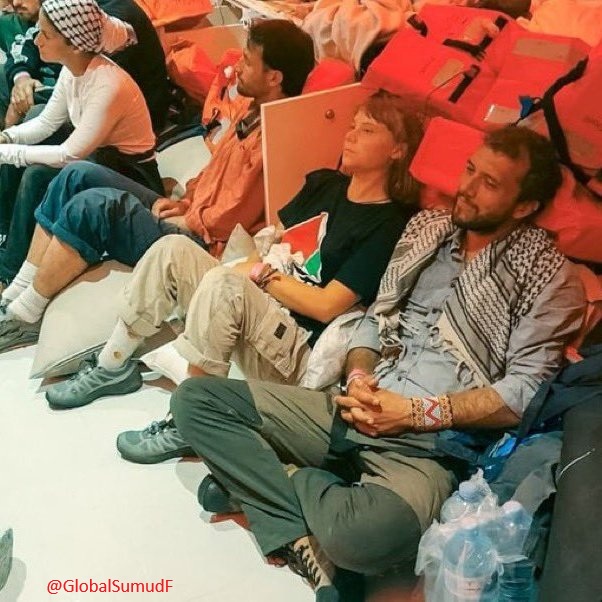By Sarosh Mustafa

Islamabd/Gaza/bursels: Israel’s interception of the last remaining vessel of the Sumud (steadfastness) Flotilla Coalition has reignited international debate over the blockade of Gaza, humanitarian relief efforts, and the limits of international maritime law.
The ship, carrying over 500 activists and modest aid supplies, was stopped in international waters before reaching Palestinian shores, marking yet another chapter in a long-running contest between Israel’s security concerns and global civil society’s challenge to the Gaza siege.
A Mission of Symbolism
The flotilla — part of a series of attempts since 2008 to breach Israel’s naval blockade — sailed with five vessels under the banner of “steadfastness.” This year’s convoy included parliamentarians, academics, and activists from across Europe, South Asia, and beyond.
High-profile passengers drew particular attention:
- Senator Mushtaq Ahmed Khan of Pakistan, a rare South Asian representative onboard.
- Greta Thunberg, the Swedish climate activist, whose participation brought intense global media scrutiny.
- Reema Hassan, a British-Palestinian academic.
- Several members of the European Parliament, signaling political weight inside Europe.
Organizers acknowledged their limited cargo of food and medicine was symbolic, but stressed the moral significance of challenging what they termed an “inhumane siege.” One activist’s message before the interception captured this spirit: “Even if our cargo is stopped, the real cargo is solidarity. That cannot be seized.”
Security vs. Solidarity
Israeli officials defended the move as necessary to prevent potential weapons smuggling and maintain the blockade imposed since Hamas took control of Gaza in 2007. Critics, however, argue that the operation underscores a deepening humanitarian crisis in Gaza, home to 2.2 million people.
Political Fallout in Pakistan and Turkey
The detention of Senator Mushtaq has elevated the issue in Pakistan, where Jamaat-e-Islami leader Hafiz Naeem ur Rehman urged Prime Minister Shehbaz Sharif to act swiftly. Islamabad has directed Deputy PM Ishaq Dar to pursue diplomatic channels, balancing domestic outrage with measured engagement.
In Turkey, the reaction has been more forceful. President Recep Tayyip Erdoğan vowed to raise the matter at the United Nations, calling it a “blatant violation of international maritime law.” Protests have already erupted in Istanbul, reviving memories of the 2010 Mavi Marmara raid, when Israeli forces killed 10 Turkish activists aboard a Gaza-bound aid ship.
Europe’s Dilemma
For the European Union, the detention of sitting lawmakers highlights the political stakes. Critics argue the credibility of Brussels’ commitment to international law will be tested if European parliamentarians can be detained without consequence.
Symbolism of Resistance
Although no flotilla has ever succeeded in delivering aid directly to Gaza, their symbolic power has grown. From the Mavi Marmara to smaller convoys in 2011 and 2018, each interception has fueled public awareness and solidarity campaigns, often at the cost of lives and arrests.
What Lies Ahead?
More than 500 activists, including parliamentarians and global figures, remain in Israeli custody. Their fate is uncertain. Yet the broader impact is clear: the flotilla has shifted discourse, forcing governments and societies alike to re-examine Gaza’s protracted isolation.
As one organizer reflected: “Every raid, every arrest, every blockade strengthens the truth of why we sail.”























